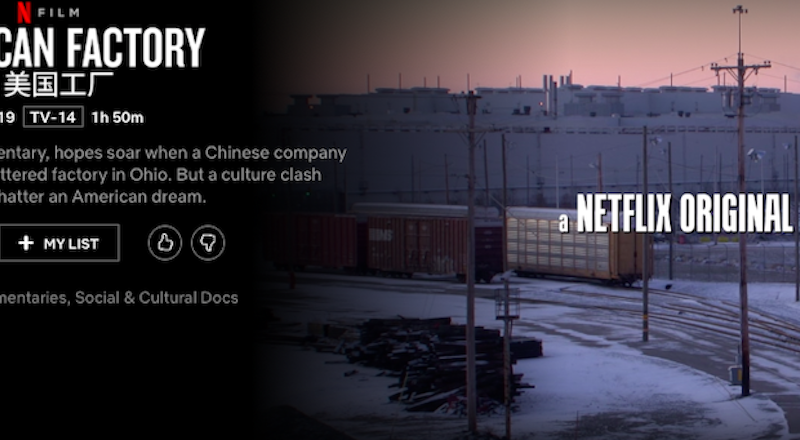‘American Factory:’ A Documentary That Hits Close To Home
Lauren Durham
Asst. Arts & Entertainment Editor
The year was 2008. Millions of Americans were living paycheck to paycheck — if they were so lucky. The recession came in swinging, and as a result, brought down one of Dayton’s most notable factories.
General Motors, located in Moraine, closed its doors on Dec. 23, 2008, leaving Daytonians feeling lost and broken. But, after an eight-year hiatus, the Gem City looked to a new product — glass.
Fuyao Glass America, a Chinese auto glass corporation, reclaimed the forlorn factory space, and in return, sought to put the city back on the industrial map. With an emphasis on the blending of Chinese and American cultures, the factory caught the attention of people all over the world. Now, the interest has escalated.
Netflix recently released the documentary titled “American Factory,” which chronicles the trials and tribulations of Fuyao and its Dayton workers. The documentary is the first release from Higher Grounds Production, former President and First Lady Barack and Michelle Obama’s film company.
Touching on policy, job availability and perhaps the current trade war, “American Factory” reveals the dark undertones of modern-day globalization.
Because the subject matter and current buzz about the documentary are far too extensive to unpack on one single page, here’s an overview of what you should know.
Why Dayton?
This may be the first question you asked yourself. It was definitely mine. Fuyao chairman Cao Dewang seems to genuinely want to help the people of Dayton, and initially hires local managers for the location. Although the motives may be selfish and merely for political gain, the Chinese employees of Fuyao seemed to take pride in their ability to lift the Gem City out of an economic slump. (I’ll be honest, seeing Dayton as a city that needed saving was tough.)
What challenges are conveyed?
There are two main conflicts that are depicted in the documentary — unionization and worker relationships. The big “U” word looms over Fuyao Glass America from the very beginning. U.S. Sen. Sherrod Brown (D-OH) mentions the possibility of creating a union at the ribbon cutting, and Mr. Cao responds, “If a union comes in, I’m shutting down.” As time goes on, Chinese industrial practices leak into the American factory lines, causing tension and unfavorable working conditions. A majority of the American workers beg and plead for a union, but they are not successful.
As one may guess, employing Ohio natives at a Chinese-based company does have its challenges, and the film paints a clear picture of the cultural differences. The Chinese workers, all of whom have to adjust to life in a new country, are expected to teach the Americans a thing or two about accuracy, efficiency and work ethic. While some of the American workers bond with their Chinese colleagues, others simply do not.
Who are the producers?
In 2008, Dayton natives Steven Bognar and Julia Reichert stood beside the factory workers as GM closed its doors with cameras in hand. The resulting 40-minute film titled “The Last Truck” earned an Oscar nomination and put the film duo on the map. When Fuyao came to town, Bognar and Reichert picked up where they left off.
The suggestion of making the film came from business leaders who had brought the plant to Dayton. They thought, “You know, this is going to be historic. A Chinese entrepreneur billionaire coming to blue-collar America and offering us jobs, this should be documented,” Reichert shared in an interview with the Hollywood Reporter.
And it was.
Why are the Obamas involved?
The Obamas were introduced to “American Factory” at this year’s Sundance Film Festival — a well-known event that showcases the work of independent filmmakers. The documentary seemed like the perfect debut for their film company, and Bognar and Reichert were flattered.
On the day of the documentary’s release, Barack Obama tweeted, “A good story gives you the chance to better understand someone else’s life. It can help you find common ground. And it’s why Michelle and I were drawn to Higher Ground’s first film, American Factory. Take a look at our conversation with the directors, and check it out on Netflix.
A good story gives you the chance to better understand someone else’s life. It can help you find common ground. And it’s why Michelle and I were drawn to Higher Ground’s first film, American Factory. Take a look at our conversation with the directors, and check it out on Netflix. pic.twitter.com/KzkYFqjrFV
— Barack Obama (@BarackObama) August 21, 2019
UD’s connection
When the chairman of Fuyao was establishing the company’s presence in the Dayton area, he crossed paths with UD. In January 2015, Mr. Cao gave a $7 million donation to help fund the University of Dayton China Institute. The university ceased academic programs at the Institute this year, but it still operates as a space for corporate trainings. Also, Fuyao factory is only an 11-minute drive from campus.
Let’s thank Netflix for bringing a not-so-far-away story into our dorms and a relevant political conversation to the table.

